- Home
- David Gemmell
Drenai Saga 01 - Legend Page 9
Drenai Saga 01 - Legend Read online
Page 9
“That man may never win. But when he sees himself reflected, he can be proud of what he sees. For low he may be in the scheme of things: peasant, serf, or dispossessed. But he is unconquerable.
“And what is death? An end to trouble. An end to strife and fear.
“I have fought in many battles. I have seen many men die. And women, too. In the main, they died proud.
“Bear this in mind as you decide your future.”
The old man’s fierce blue eyes scanned the faces in the crowd, gauging the reaction. He knew he had them. It was time to leave.
He bade his farewells to Pinar and the rest, settled his bill despite the protestations of the innkeeper, and set off for Skultik.
He was angry as he walked, feeling the stares on his back as the inn emptied to watch him go. He was angry because he knew his speech had been a falsehood, and he was a man who liked the truth. Life, he knew, broke many men. Some as strong as oak withered as their wives died, or left them, as their children suffered or starved. Other strong men broke if they lost a limb or, worse, the use of their legs or their eyesight. Each man had a breaking point, no matter how strong his spirit. Somewhere, deep inside him, there was a flaw that only the fickle cruelty of fate could find. A man’s strength was ultimately born of his knowledge of his own weakness, Druss knew.
His own fear was of dotage and senility. The thought of it set him to trembling. Did he really hear a voice at Skoda, or was it merely his own terror booming inside him?
Druss the Legend. Mightiest man of his era. A killing machine, a warrior. And why?
Because I never had the courage to be a farmer, Druss told himself.
Then he laughed, dismissing all somber thoughts and self-doubt. It was a talent he had.
Today had a good feel about it. He felt lucky. If he kept to known trails, he would certainly meet outlaws. One old man alone was a package not to be missed. They would be a sorely inefficient lot if he were to pass through the forest unnoticed and unattended.
The woods were becoming thicker now as he reached the outskirts of Skultik. Huge, gnarled oaks, graceful willows, and slender elm interlinked their branches for as far as the eye could see—and greatly beyond, Druss knew.
The noon sun made shafts of shimmering light through the branches, and the breeze carried the sounds of miniature waterfalls from hidden streams. It was a place of enchantment and beauty.
To his left a squirrel ceased its hunt for food and gazed warily at the old man as he marched past. A fox crouched in the undergrowth, and a snake slithered beneath a fallen trunk as he approached. Overhead birds sang, a chorus full of the sounds of life.
Throughout the long afternoon Druss marched on, occasionally bursting into song, full-bodied and lusty versions of battle hymns from a score of nations.
Toward dusk he became aware that he was being watched.
How he was aware he could never explain. A tightening of the skin on his neck, a growing awareness that his back made a broad target. Whatever it was, he had learned to trust his senses in the matter. He loosened Snaga in its sheath.
Some moments later he entered a small clearing in a grove of beech trees, which were slender and wandlike against a background of oak.
At the center of the clearing, on a fallen trunk, sat a young man, dressed in homespun garments of green tunic and brown leather leggings. Upon his legs lay a longsword, and by his side was a longbow and a quiver of goose-feathered arrows.
“Good day, old man,” he said as Druss appeared. Lithe and strong, thought Druss, noting with a warrior’s eye the catlike grace of the man as he stood, sword in hand.
“Good day, laddie,” said Druss, spotting a movement to his left in the undergrowth. Another whisper of branch on cloth came from his right.
“And what brings you to our charming forest?” asked the young man. Druss casually walked to a nearby beech and sat, leaning his back against the bark.
“A desire for solitude,” he said.
“Ah, yes. Solitude! And now you have company. Perhaps this is not a lucky time for you.”
“One time is as lucky as another,” said Druss, returning the other’s smile. “Why don’t you ask your friends to join us? It must be damp skulking in the bushes.”
“How rude of me, to be sure. Eldred, Ring, come forward and meet our guest.” Sheepishly two other young men pushed their way through the greenery to stand beside the first. Both were dressed in identical clothing of green tunic and leather leggings. “Now we are all here,” said the first.
“All except the bearded one with the longbow,” said Druss.
The young man laughed. “Come out, Jorak. Old father here misses nothing, it seems.” The fourth man came into the open. He was large—a head taller than Druss and built like an ox, his massive hands dwarfing the longbow.
“Now, dear sir, we are all here. Be so kind as to divest yourself of all your valuables, for we are in a hurry. There is a stag roasting at camp, and sweet new potatoes garnished with mint. I don’t want to be late.” He smiled almost apologetically.
Druss bunched his powerful legs beneath him, rising to his feet, his blue eyes glinting with battle joy.
“If you want my purse, you will have to earn it,” he said.
“Oh, damn!” said the young man, smiling and reseating himself. “I told you, Jorak, that this old fellow had a warrior look about him.”
“And I told you that we should have merely shot him down and then taken his purse,” said Jorak.
“Unsporting,” said the first. He turned to Druss. “Listen, old man, it would be churlish of us to shoot you down from a distance, and that sets us a pretty problem. We must have your purse, don’t you see? No point in being a robber else.” He paused, deep in thought, then spoke once more. “You’re obviously not a rich man, so whatever we get will not be worth a great deal of effort. How about spinning a coin? You win, you keep your money; we win, we take it. And I’ll throw in a free meal. Roast stag! How does that sound?”
“How about if I win, I get your purses and a meal?” asked Druss.
“Now, now, old horse! No point in taking liberties when we’re trying to be friendly. All right! How about this? Honor needs to be satisfied. How about a little skirmish with Jorak here? You look quite strong, and he’s a dab hand at bare-knuckle squabbles.”
“Done!” said Druss. “What are the rules?”
“Rules? Whoever is left standing wins. Win or lose, we’ll stand you a supper. I rather like you; you remind me of my grandfather.”
Druss grinned broadly, reached into his pack, and pulled on his black gauntlets. “You don’t mind, do you, Jorak?” he asked. “It’s the old skin on my knuckles—it tends to split.”
“Let’s get it over with,” said Jorak, advancing.
Druss stepped in to meet him, taking in the awesome breadth of the man’s shoulders. Jorak lunged, hurling a right cross. Druss ducked and crashed his own right fist into the other’s belly. A whoosh of air exploded from the giant’s mouth. Stepping back, Druss thundered a right hook to the jaw, and Jorak hit the ground face first. He twitched once, then lay still.
“The youth of today,” said Druss sadly, “have no stamina!”
The young leader chuckled. “You win, Father Time. But look. For the sake of my fast-diminishing prestige, give me the opportunity of besting you at something. We will have a wager: I wager my purse against yours that I am a better archer.”
“Hardly a fair bet, laddie. I will concede that point. But I will make a wager with you: strike the trunk of the tree behind me with one arrow and I’ll pay up.”
“Come now, dear sir, where is the art in that? Less than fifteen paces, and the bole is three hands wide.”
“Try it and see,” offered Druss.
The young outlaw shrugged, hefted his bow, and drew a long arrow from his doeskin quiver. With a fluid motion his strong fingers drew back the string and released the shaft. As the outlaw’s bow bent, Druss drew Snaga and the ax sang through t
he air in a glittering arc of white light as he sliced the blade to his right. The outlaw’s shaft splintered as the ax struck. The young man blinked and swallowed. “I would have paid to have seen that,” he said.
“You did!” said Druss. “Where is your purse?”
“Sadly,” said the young man, pulling his pouch from his belt, “it is empty. But the purse is yours, as we agreed. Where did you learn that trick?”
“In Ventria, years ago.”
“I’ve seen some ax work in the past. But that bordered on the incredible. My name is Bowman.”
“I am Druss.”
“I know that, old horse. Actions speak louder than words.”
8
Hogun swallowed back despair, his mind working furiously. He and two hundred of his legion riders faced more than a thousand Nadir dog soldiers, the cavalry wing of Ulric’s forces.
Sent out to gauge the strength and disposition of the Nadir horde, Hogun was over 150 miles from Delnoch. He had all but pleaded with Orrin to forsake this plan, but the first gan was not to be dissuaded.
“A refusal to obey a direct order is punishable by instant dismissal for any of gan rank. Is that what you wish, Hogun?”
“You know that’s not what I’m saying. What I am telling you is that this mission is futile. We know from our spies and countless refugees the strength of Ulric’s forces. Sending two hundred men into that wasteland is insane.”
Orrin’s brown eyes had blazed with anger, his fat chin trembling in a bid to suppress his fury. “Insane, is it? I wonder. Is it just that you don’t like the plan, or is the famed Corteswain warrior afraid to meet the Nadir?”
“The black riders are the only seasoned troop of proven worth you have here, Orrin,” he said as persuasively as he could. “You could lose all two hundred men with such a scheme and learn from it no more than we already know. Ulric has five hundred thousand men and more than twice that in camp followers, cooks, engineers, and whores. He will be here within six weeks.”
“Hearsay,” muttered Orrin. “You leave at first light.”
Hogun had come close to killing him then, close enough for Orrin to sense danger.
“I am your senior officer,” he said, his voice close to a whine. “You will obey me.”
And Hogun had. With two hundred of his finest men, mounted on black horses—bred for generations as the finest war mounts on the continent—he had thundered his troop northward as the dawn sun breasted the Delnoch mountains.
Out of sight of the Dros he had slowed the column and signaled the men to ride at ease, free to talk to their riding companions. Dun Elicas cantered alongside him, reining his horse to a walk.
“A bad business, sir.”
Hogun smiled but did not answer. He liked young Elicas. The man was a warrior born and a fine lieutenant. He sat a horse as if he had been born on one, a true centaur. And a hellion in battle, with his custom-made silver steel saber, two inches shorter than the standard version.
“What are we supposed to be finding out?” he asked.
“The size and disposition of the Nadir army,” answered Hogun.
“We know that already,” said Elicas. “What is the fat fool playing at?”
“Enough of that, Elicas,” he said sternly. “He wants to be sure the spies were not … exaggerating.”
“He’s jealous of you, Hogun; he wants you dead. Face it, man. No one can hear us. You know what he is—a courtier. And he has no guts. The Dros won’t last a day; he’ll open the gates for sure.”
“He’s a man under terrible pressure. The whole of the Drenai cause rests on his shoulders,” said Hogun. “Give him time.”
“We don’t have time. Look, Hogun, send me to Woundweaver. Let me explain our situation. He could be replaced.”
“No. Believe me, Elicas, it would achieve nothing. He’s Abalayn’s nephew.”
“That old man has a lot to answer for,” snarled Elicas. “If we do somehow get out of this business alive, he will fall for sure.”
“He has ruled for thirty years. It’s too long. But as you say, if we do get out alive, it will be because of Woundweaver. And it’s certain he will take control.”
“Then let me ride to him now,” urged Elicas.
“The time isn’t right. Woundweaver cannot act. Now, leave it alone. We will do our job and, with luck, get away without being spotted.”
But luck had not been with them. Five days out from Delnoch they had come across three Nadir outriders. They had killed only two, the third ducking down over the neck of his steppe pony and riding like the wind into a nearby wood. Hogun had ordered an immediate withdrawal and might have pulled it off had he enjoyed an ounce of luck. Elicas has been the first to spot the mirror messages flashing from peak to peak.
“What do you think, sir?” he asked as Hogun reined in.
“I think we will need good fortune. It depends on how many dog soldiers they have in the vicinity.”
The answer was not long in coming. Toward late afternoon they saw the dust cloud south of them. Hogun glanced over his back trail.
“Lebus!” he called, and a young warrior cantered alongside.
“You have eyes like a hawk. Look back there. What do you see?”
The young soldier shielded his eyes from the sun, then squinted at their back trail.
“Dust, sir. From maybe two thousand horses.”
“And ahead?”
“Perhaps a thousand.”
“Thank you. Rejoin the troop. Elicas!”
“Sir?”
“Cloaks furled. We will take them with lances and sabers.”
“Yes, sir.” He cantered back down the column. The black cloaks were unpinned and folded to be strapped to saddles. The black and silver armor glinted in the sunlight as man after man began to prepare for the charge. From saddlebags each rider removed a black and silver forearm guard and slipped it in place. Then small round bucklers were lifted from saddle horns to be fitted to the left arm. Straps were adjusted, and armor tightened. The approaching Nadir could now be seen as individuals, but the sound of their battle cries was muffled by the pounding of horses’ hooves.
“Helms down!” yelled Hogun. “Wedge formation!”
Hogun and Elicas formed the point of the wedge, the other riders slipping expertly into position a hundred on either side.
“Advance!” yelled Elicas. The troop broke into a canter; then, at full gallop, the lances tilted. As the distance narrowed, Hogun felt his blood racing and could hear his pounding heart in time with the rolling thunder of the black horses’ iron-shod hooves.
Now he could pick out individual Nadir faces and hear their screams.
The wedge smashed into the Nadir ranks, the larger black war-horses cleaving a path through the mass of smaller hill ponies. Hogun’s lance speared a Nadir chest and snapped as the man catapulted from his pony. Then his saber slashed into the air; he cut one man from his mount, parried a thrust from the left, and backhanded his blade across the throat of the horseman. Elicas screamed a Drenai war cry from his right, his horse rearing, the front hooves caving in the chest of a piebald pony that ditched his rider beneath the milling mass of black riders.
And then they were through, racing for the distant, fragile safety of Dros Delnoch.
Glancing back, Hogun saw the Nadir re-form and canter to the north. There was no pursuit.
“How many men did we lose?” he asked Elicas as the troop slowed to a walk.
“Eleven.”
“It could have been worse. Who were they?”
Elicas recounted the names. All good men, survivors of many battles.
“That bastard Orrin will pay for this,” said Elicas bitterly.
“Forget it! He was right. More by luck than any judgment, but he was right.”
“What do you mean ‘right’? We’ve learned nothing, and we’ve lost eleven men,” said Elicas.
“We have learned that the Nadir are closer than we believed. Those dog soldiers were Wolfshead tribe. Tha
t’s Ulric’s own; they’re his personal guard. He’d never send them that far ahead of his main force. I’d say we now have a month—if we’re lucky.”
“Damn! I was going to gut the pig and take the consequences.”
“Tell the men no fires tonight,” said Hogun.
Well, fat man, he thought, this is your first good decision.
May it not be the last.
9
The forest had an ageless beauty that touched Druss’s warrior soul. Enchantment hung in the air. Gnarled oaks became silent sentinels in the silver moonlight, majestic, immortal, unyielding. What cared they for man’s wars? A gentle breeze whispered through the interwoven branches above the old man’s head. A shaft of moonlight bathed a fallen log, granting it momentarily an ethereal splendor. A lone badger, caught in the light, shuffled into the undergrowth.
A raucous song began among the men crowded around the blazing camp fire, and Druss cursed softly. Once again the forest was merely forest, the oaks outsize plants. Bowman wandered across to him, carrying two leather goblets and a wine sack.
“Finest Ventrian,” he said. “It’ll turn your hair black.”
“I’m all for that,” said Druss. The young man filled Druss’s goblet, then his own.
“You look melancholy, Druss. I thought the prospect of another glorious battle would lighten your heart.”
“Your men are the worst singers I have heard in twenty years. They’re butchering that song.” Druss replied, leaning his back against the oak, feeling the wine ease his tension.
“Why are you going to Delnoch?” asked Bowman.
“The worst were a bunch of captured Sathuli. They just kept chanting the same bloody verse over and over again. We let them go in the end—we thought that if they sang like that when they got home, they’d break the fighting spirit of their tribe in a week.”
“Now look here, old horse,” said Bowman. “I am a man not easily thrown. Give me an answer—any answer! Lie if you like. But tell me why you travel to Delnoch.”
“Why do you want to know?”

 Bloodstone
Bloodstone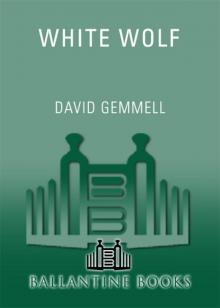 White Wolf
White Wolf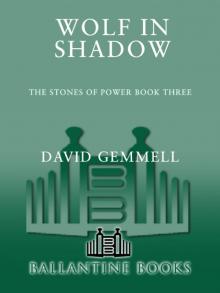 Wolf in Shadow
Wolf in Shadow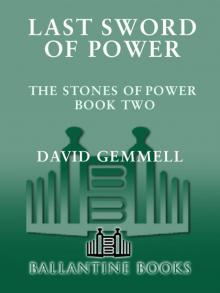 Last Sword of Power
Last Sword of Power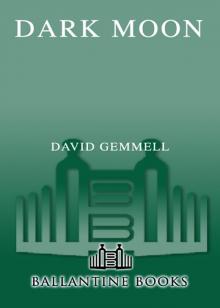 Dark Moon
Dark Moon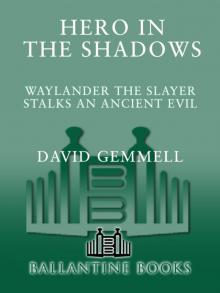 Hero in the Shadows
Hero in the Shadows Gemmell, David - Drenai 09 - Hero In The Shadows
Gemmell, David - Drenai 09 - Hero In The Shadows Waylander
Waylander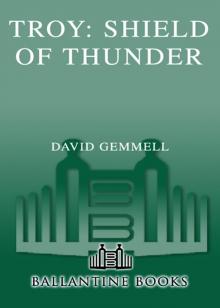 Shield of Thunder
Shield of Thunder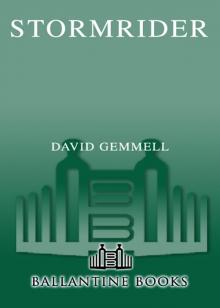 Stormrider Stormrider
Stormrider Stormrider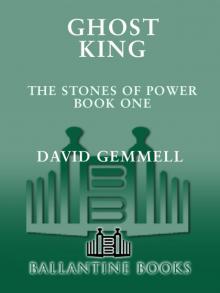 Ghost King
Ghost King Legend
Legend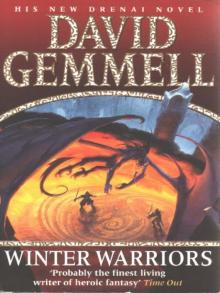 Winter Warriors
Winter Warriors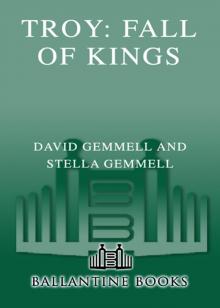 Fall of Kings
Fall of Kings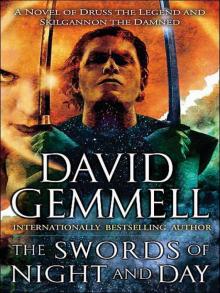 The Swords of Night and Day
The Swords of Night and Day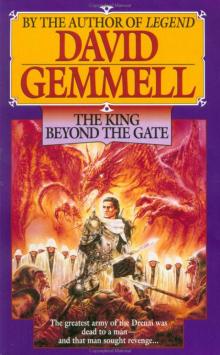 The King Beyond the Gate
The King Beyond the Gate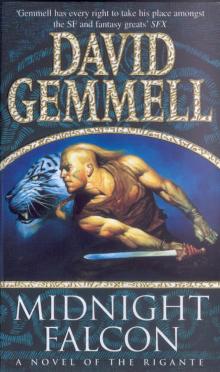 Midnight Falcon
Midnight Falcon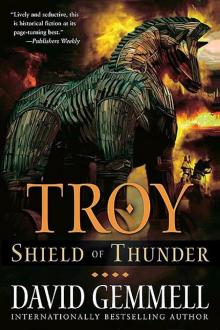 02 - Shield of Thunder
02 - Shield of Thunder In the Realm of the Wolf
In the Realm of the Wolf Ravenheart
Ravenheart The First Chronicles of Druss the Legend
The First Chronicles of Druss the Legend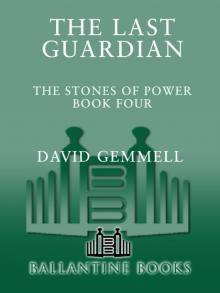 Last Guardian
Last Guardian Stormrider
Stormrider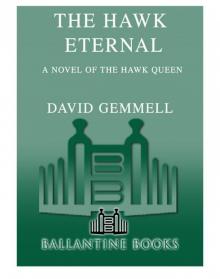 The Hawk Eternal
The Hawk Eternal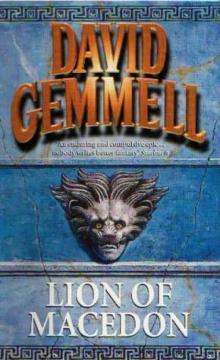 Lion of Macedon
Lion of Macedon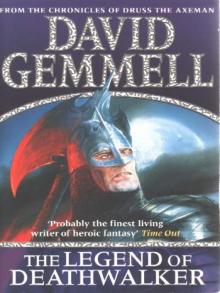 The Legend of Deathwalker
The Legend of Deathwalker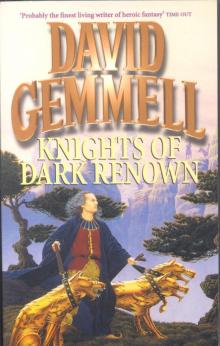 Knights of Dark Renown
Knights of Dark Renown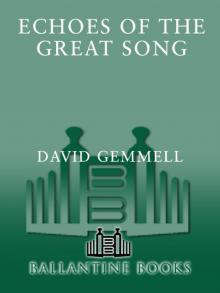 Echoes of the Great Song
Echoes of the Great Song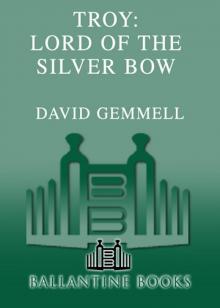 Lord of the Silver Bow
Lord of the Silver Bow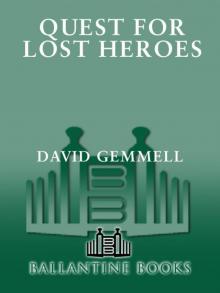 Quest for Lost Heroes
Quest for Lost Heroes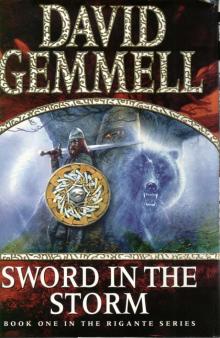 Sword in the Storm
Sword in the Storm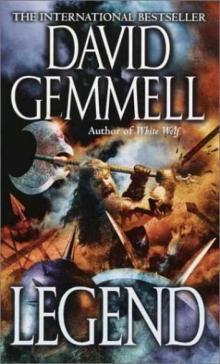 Drenai Saga 01 - Legend
Drenai Saga 01 - Legend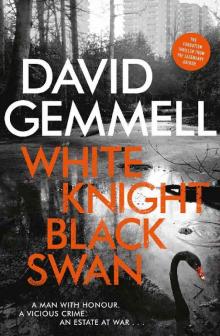 White Knight/Black Swan
White Knight/Black Swan![[Troy 02] - Shield of Thunder Read online](http://i1.bookreadfree.com/i/03/19/troy_02_-_shield_of_thunder_preview.jpg) [Troy 02] - Shield of Thunder
[Troy 02] - Shield of Thunder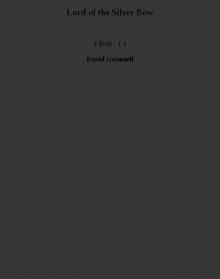 Lord of the Silver Bow t-1
Lord of the Silver Bow t-1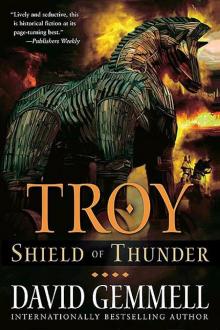 Shield of Thunder t-2
Shield of Thunder t-2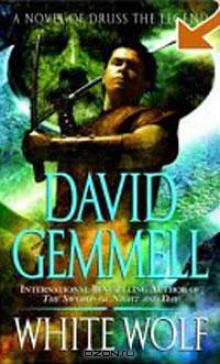 White Wolf: A Novel of Druss the Legend dt-10
White Wolf: A Novel of Druss the Legend dt-10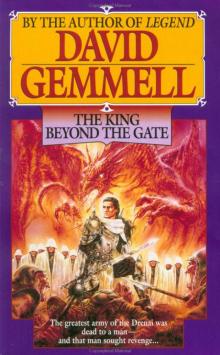 Drenai Saga 02 - The King Beyond the Gate
Drenai Saga 02 - The King Beyond the Gate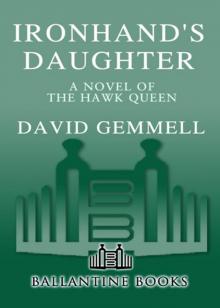 Ironhand's Daughter
Ironhand's Daughter Gemmell, David - Drenai 06 - The First Chronicles of Druss the Legend
Gemmell, David - Drenai 06 - The First Chronicles of Druss the Legend The Last Guardian
The Last Guardian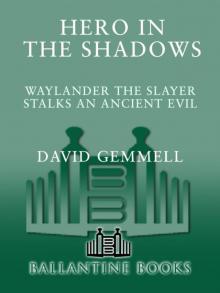 Hero in the Shadows: A Waylander the Slayer Novel
Hero in the Shadows: A Waylander the Slayer Novel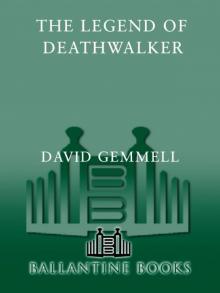 The Legend of the Deathwalker
The Legend of the Deathwalker